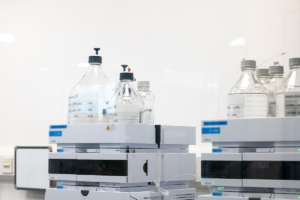Source
Brains Bioceutical is one of the few companies in the world producing CBD as an Active Pharmaceutical Ingredient for medicine. Now it’s set its sights on the UK market.
Based at what was the former Pfizer facility in Sandwich, Kent, in the building where antibiotics were first developed, the team at Brains Bioceutical is working on the latest medical revolution.
The UK arm of Brains, BSPG Laboratories, recently moved into an additional 21,000 square foot state-of-the-art facility to build a new state-of-the-art laboratory. Here, it will continue its work, as one of few companies in the world, producing CBD as an Active Pharmaceutical Ingredient (API) for medical treatments, research and development and clinical trials.
Brains has been involved in a number of studies since its inception in Canada in 2015 and is currently being used in a phase 3, double-blind trial in Brazil, using CPB API for treatment of refractory epilepsy.
It is keen to shake things up here in the UK market, where GW Pharmaceuticals currently holds the monopoly as the producer of Epidiolex, one of just three licensed cannabis medicines in the UK.
Chief operating officer, Dean Billington, a former employee of GW, says: “Epidiolex targets refractory epilepsy specifically, but one of the major differences between our CBD and GW’s product is the cost – Epidiolex is hugely expensive.”
He continues: “Secondly it contains up to eight percent alcohol, which is not desirable from a paediatric perspective, and it also contains other flavourings and antioxidants.
“Our CBD is made purely from industrial hemp. Whilst industrial hemp is part of the cannabis family, it is not the cannabis plant and therefore, a lot of the cannabinoids that may well be present in very small amounts in the GW product may not be present in ours.”
Another major difference, of course, is that as a licensed cannabis medicine, Epidiolex is approved for a limited number of conditions in the UK, whereas Pure Brains CBD being unlicensed is classed as a ‘special’.
A ‘special’ can be prescribed for a specific
use as determined by the prescriber.
Billington explains: “Unlicensed products are classed as ‘specials’, meaning a doctor can prescribe it if they deem that their patient will benefit, so our CBD could actually be prescribed for almost anything.”
The product has in fact been used by researchers investigating the effect of CBD on mental health conditions such as anxiety, depression and PTSD. Brains’ scientific partners at King’s College London indicated use of the product as a potential therapeutic drug for COVID-19 in their clinical study proposal.
Pure Brains CBD is being now used to prepare capsules or suppositories for those COVID 19 patients that need incubation and assisted breathing.
The team is also keen to explore the potential of other components of the plant – after all, there are still 144 cannabinoids yet to be discovered.
Having waited five years for the go-ahead from the Home Office to be able to import CBD containing even tiny amounts of THC, Brains has finally received its schedule one licence and now plans to branch out.
“There is some early data that shows several other cannabinoids have great potential for various diseases and indications,” says Billington.
“It’s very important, as with traditional pharmaceutical development, that you start off with a single molecule and fully understand how that molecule behaves. Then, if at some point you then want to combine that molecule with other molecules you have a good understanding of them all.”
He continues: “The industry has a dilemma, in that the cannabis plant doesn’t fit into the traditional process of developing a drug. “There’s a decision to be made at some point – are we going to strictly enforce the traditional way of doing things? Or, are we going to develop a specific process for cannabis based medicines, when quite clearly there is a lot of anecdotal evidence that medicinal cannabis works?
“I think there’s a place for both. While there is a very clear proven pathway for pharmaceutical development, there is no doubt that cannabis medicines, where used properly and appropriately do have a benefit to the patient.
Billington adds: “My principal focus is on the patient. If a patient benefits from a medicine, they should have access to it.”
Many patients with intractable epilepsy have found that Epidiolex is not as effective as cannabis medicines which contain both CBD and THC, with neurologist and medical cannabis expert, Professor Mike Barnes, describing unlicensed cannabis medicines as “far superior”.
Billington admits that CBD doesn’t work for everyone.
“There is evidence to suggest that somebody who starts on CBD, as they grow and develop, may eventually require the addition of some THC as well,” he says.
“The combination of the cannabinoids they require to sustain their quality of life changes over time.
“In terms of the molecule itself, Brains CBD API products are very similar to the Epidiolex product, but we want to take it a step further and develop a series of cannabinoids, including THC, which then have the ability to effectively personalise cannabinoid medication for people.”
Brains have a number of products, including Pure CBD on its own, but also the PURUS range, which is a combination of three CBD:THC products in various ratios.
“What that does is give doctors the opportunity to prescribe products containing THC, which is now legal in the UK,” Billington adds.
“With Epidiolex, GW is very focused on a particular indication, whereas I we’re taking a slightly wider view, developing CBD and encouraging organisations to look at lots of different potential indications.”
The Brains philosophy consists of several pillars. As well as human and veterinary medicinal products, they are also invested in the potential of cannabis in wellness and athletics, with the launch of the ALTIS / Brains Bioceutical Living Lab facility, a state-of-the-art, athletics-training facility that explores the power of CBD API in elite athletes.
“The clinical trials need to be done and the anecdotal evidence collected and evaluated, but the people I know that use CBD for a number of indications all tell me that they feel a benefit,” says Billington.
“CBD is a very pure product, it’s no different than Ibuprofen, or any of the other active pharmaceutical ingredients that are used to formulate medicinal products anywhere in the world – but it’s about generating the data to show the benefits clearly.”
He adds: “We’re a growing company, with great aspirations and we really believe in CBD and the future potential of other cannabinoids.”





